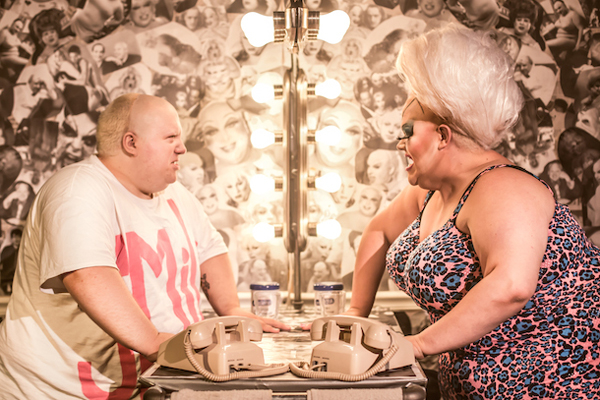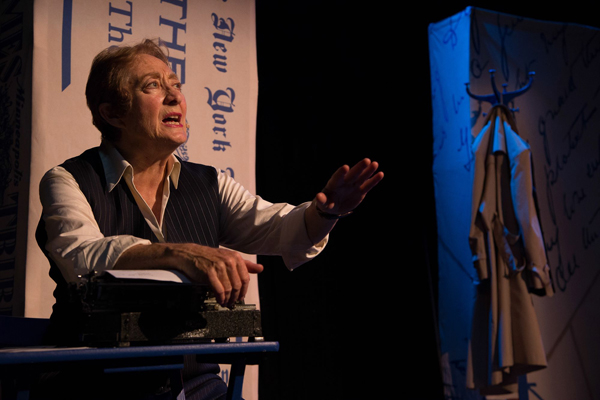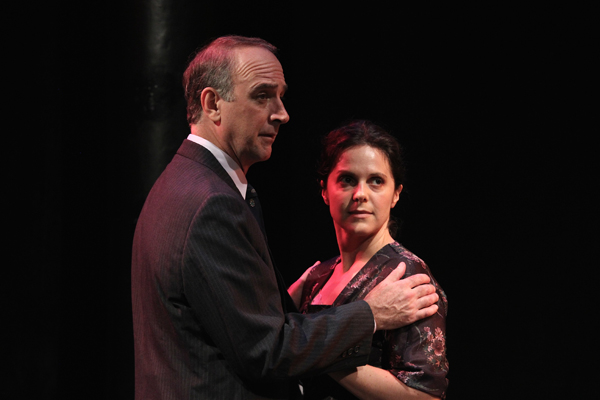FringeNYC 2015: Divine/Intervention; Hick; The Report

(© Garrett Matthew)
"Society has come to recognize and appreciate the sharp-tongued, 'bitchy' humor of gay men," notes Dr. Alan Downs, author of The Velvet Rage. Dr. Downs argues that this acid wit is an expression of entrenched anger and a need for validation. That certainly seems to be the case for Glenn Milstead, the protagonist of E. Dale Smith's searing and insightful new drama Divine/Intervention.
Milstead was the offstage persona of Divine, international drag sensation and muse to filmmaker John Waters. Or was Divine the alter ego of Milstead? Smith captures the power struggle between creator and creation at the ultimate moment of truth: the night of Milstead's untimely death in 1988.
Milstead (Ryan Walter) is about to make his major television debut (dressed as a man) on Married With Children. Before that he has to face Divine (Bobby Goodrich), the outrageous queen who carried him to stardom. Director Braden Chapman (better known by his drag moniker, Mimi Imfurst) has staged this as a confrontation through the looking glass: Mark A. Dahl's clever set depicts Milstead's hotel room stage-right, with Divine in its mirror image-stage left.
Walter and Goodrich believably play two aspects of the same person, with Goodrich eerily channeling the shrill, aggressive Divine that we've come to know from films like Pink Flamingos and Female Trouble. "I'm sweating like a whore in church," she shouts into a microphone, re-creating a raucous appearance at a disco. And with the air conditioner at Culture Project broken, many in the audience were fanning themselves like Alabama Baptists, ready to hear her preach.
Testify Divine does, to our great delight, especially when she takes down a nasty heckler. Yet her backstage shredding of a small-town queen named Peggy (the amiable Terrell Green) is distinctly less funny. Of course, this shady Mrs. Hyde reserves her cruelest barbs for Milstead, a sympathetic Dr. Jekyll.
Unfortunately, their epic final battle feels like an airplane circling LaGuardia, looking for a place to land. Walter and Goodrich keep us riveted, but some smart editing for redundancy has the potential to make this already sharp drama even more piercing. As hilarious as Divine/Intervention is, it will also leave many in the audience questioning their own deep-seated anger and need for validation. Hopefully, Divine will be staging her intervention in a venue beyond the Fringe sometime soon.

(© Lilith Theater)
"She could be a very naughty girl," Lorena Hickok says, lust dripping from her voice. She's talking about the 34th First Lady of the United States, Eleanor Roosevelt. It is unlikely that many people think of Roosevelt in such sexually explicit terms, but Hickok certainly did, at least according to Terry Baum in her one-woman show Hick. It's an important story made even more unique by the distinct lack of lesbian love stories onstage, especially those featuring older women. Unfortunately, Baum's awkward and stilted presentation doesn't result in the memorable theatrical experience one would want.
Told completely from the perspective of "gal reporter" Lorena Hickok, Hick charts the relationship between the two women. Starting as the AP correspondent covering the Roosevelt presidential campaign of 1932, Hickok became the first lady's closest confidant and traveling partner. This is a transition that is not without cost to Hickok, who has to sacrifice her life as a journalist to this blatant conflict of interest. "I had a byline once," she growls like Norma Desmond.
The story emerges as an extended flashback from an elderly Hickok, a plodding convention in the hands of director Adele Prandini. As a reporter she wears a three-piece skirt suit (handsomely crafted by Seymour Fashions). As an old woman she wears a robe over that, a transformation too insignificant to justify the nearly minute-long scene transitions. For a solo show, Hick moves at a ponderous pace.
The performance doesn't help this sluggishness. Baum telegraphs most of her choices so that it is impossible not to see the gears churning in her head. At one point Hickok considers publishing her advance knowledge of the president's inauguration speech. "Hmmmmm," she ponders head in hand. "But then I would violate Eleanor's trust." Every conflict is presented in such slap-you-in-the-face-obvious terms, leaving little room for nuance.
What art there is in the script derives from the voluminous correspondence between Roosevelt and Hickok, which Baum wisely and liberally quotes. These impassioned letters make it clear that theirs was a love for the ages, still awaiting a proper immortalization onstage.

(© Lia Chang)
The largest single civilian loss of life in the UK during World War II took place on the evening of March 3, 1943. It wasn't the result of a German bomb, but a mass panic and stampede when 173 people died trying to enter the Bethnal Green tube station. This terrible disaster is the subject of Martin Casella's thoughtful new drama, The Report, which is based on the historical novel by Jessica Francis Kane. The play is as challenging as it is worthwhile, sure to haunt you for days as you try to unfold the conflicting accounts and motives of the characters involved.
Paul Barber (Stuart Williams) is a television producer looking to create a BBC documentary about the Bethnal Green tragedy. He's hoping to secure an interview with Sir Laurence Dunne (Michael Countryman), the man originally charged with investigating the incident for the Churchill government. We follow Dunne as he interviews the survivors of Bethnal Green, discovering a complicated truth that threatens to break open the scab of this wounded East End community.
Director Alan Muraoka marshals the 12-person ensemble through a barrage of overlapping scenes jumping across time and space. Such a light-on-its-feet approach is really the only way to tell a story as exposition-heavy as this one. With the help of Darren Lee's hyper-specific choreography and Lauren Halpern's utilitarian set, Muraoka thrillingly succeeds in not only keeping everything straight, but adding the little details that one would expect from a particularly good mystery novel. Brian Hemesath's handsome costumes give us a sense not only of the period, but the individual personalities at play.
The cast adds another dimension with their nuanced and layered performances. Countryman authentically portrays a man in retreat from the world. Zoë Watkins is appropriately inscrutable as Ada Barber, a woman who is as much a victim as she is a perpetrator of the crime. As Warden James Low, Denny Desmarais is simultaneously defensive and wracked with guilt. Everyone seems to land on a different explanation for this awful event, but no one is satisfied.
The Report tells the story of the messy relationship between truth and reconciliation, two concepts that don't necessarily go hand in hand.













